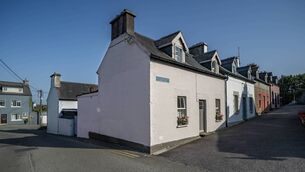Stone flooring
Stone used for flooring can be polished or honed for a smooth finish and this makes a serious difference to the way it which it performs and survives underfoot. A honed surface stops short of a full polish and this texture delivers a non-slip finish perfect for flooring. Honed stone also hides minor wear and tear much better than its mirror shine equivalent. Terracotta, although a fired material, is generally included in the family of natural stone flooring and is well worth considering if you are on a budget and fancy an honest, honed surface.
Limestone comes in a range of guises from soft open poured travertine tiles to gritty, rugged flags. Softer limestone is not dense enough to withstand a full polish and like sandstone is left with a subtle honed surface. As well as being composed in patterns and borders using shape and colour, travertine can also be purchased engraved with bas-relief decoration or even sandblasted and is vein cut or crosscut for a distinctly different look. Regan Tile Designs Sassi (01-2800921) offer engraved panels for floor and walls in Italian travertine (Sassi Assisi) and mosaic panels and applied frescos from Padovani. Native limestones such as Liscannor taken from the Cliffs of Moher proudly wear traces of their geology in fascinating fossil tracks of marine worms that traveled through the ancient sentiments of Ireland over 350 million years ago. Liscannor limestone (065-7074078) provides an excellent non-slip flagstone that is perfect for indoor or outdoor paving. Dense, low absorbent varieties of limestone can be used in the bathroom but avoid using a soft limestone underfoot in high-stress area.













